Brigandine seems one of the most popular medieval armor. It was used as by common poor soldiers, so by noble rich knights and commanders.
In this article, we would like to do short review of this unique body protection.
Brigandine is an armour of brigand. There was a name of adventuring soldiers in Italy in the Middle Ages, given by civilians. Professional warriors were gathering troops and getting around seeking out money and better life. They were hired out for army service, fighting, plundering and fooling around in every possible way.
Such kind of soldiers were growing rich very rare. They did not have money for expensive equipment. That is why they needed affordable, but quality armour. Brigandine as a type of medieval body protection came into fashion in time and got expensive decorations and fabrics. Noble men and aristocracy started to wear brigandines not only for a battle, but for a show as well.
Brigandine is an armour that is made of metal plates and fabric base. It was widespread in Europe and some Asian countries from XIII to the XIV centuries. Leather could be used instead of fabric, but design features were not changed.
It is considered that brigandine was developed from coat of plates – protective clothing, that was used in the X-XII centuries.
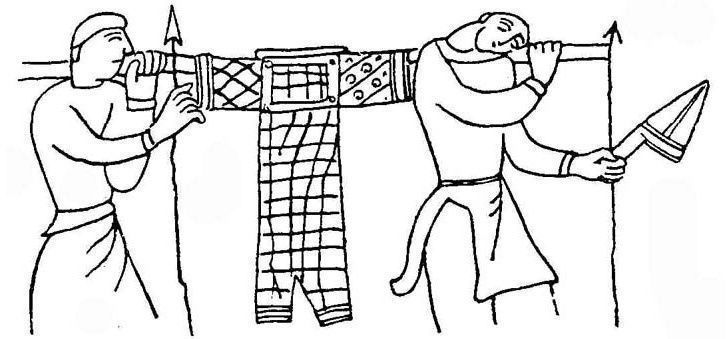
Warriors, carrying an armour, Bayeux Tapestry, late XI century
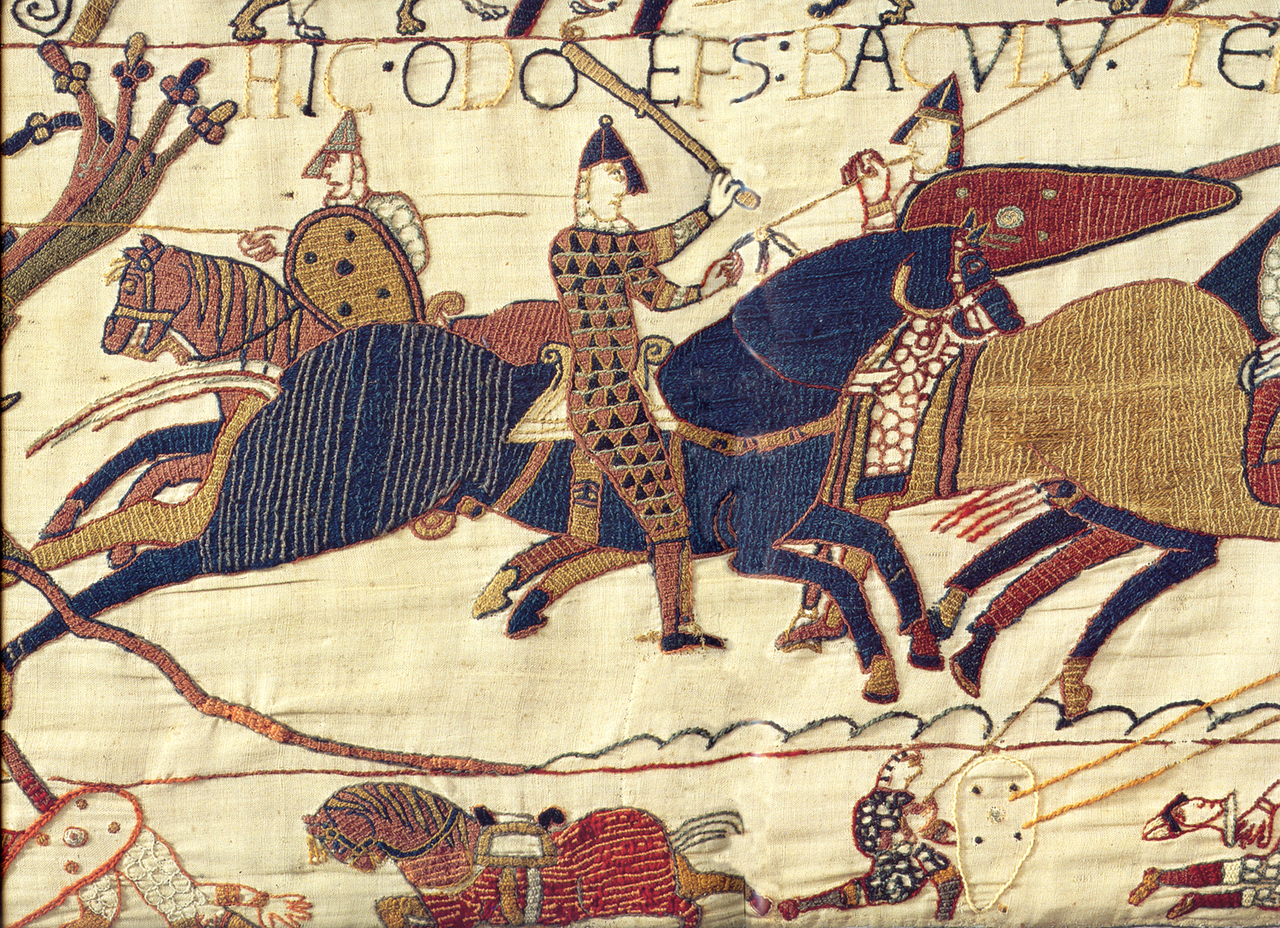
Bayeux Tapestry, late XI century
How do we know about such armour?
Archaeologists and historians should be every lucky with brigandines. As there are plenty of images of such type of armour shown in medieval literature. Many frescoes, statues and reliefs are saved in churches and cathedrals.

Brigandine of Otto von Orlamünde, 1340-1360, Germany
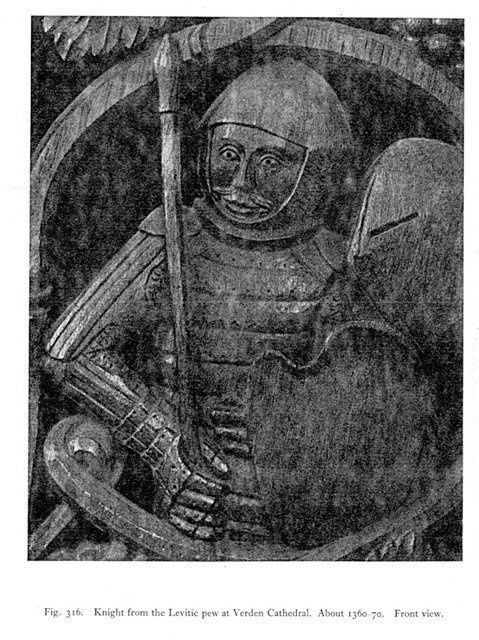
Image from the Levite pew, Verdun Cathedral, circa 1360-1370 years. Verdun, France
However, an archaeology is the most interesting thing. For example, few samples of brigandine body protection of the 1340-1360 years were found during excavations near of Kussnach (Küsnacht) castle in Switzerland, and restored after that. Pay attention at metal strips around the body part: brigandine from Kussnach is an analogous to Roman lorika. Anyway, let’s talk about it a little bit later.
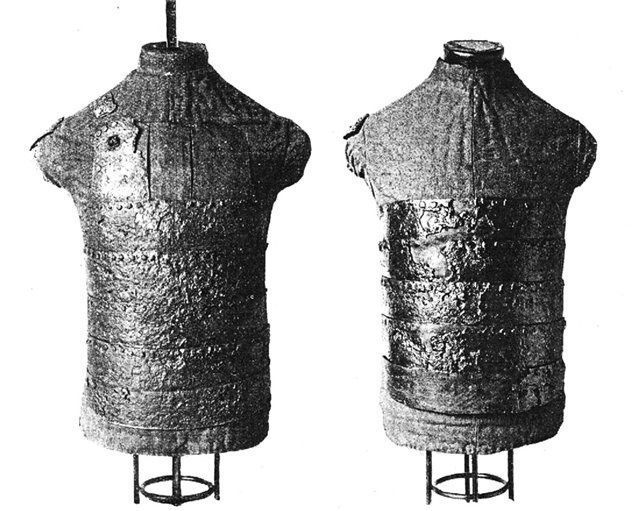
Showpiece #1, from Kussnach
Excavations of burial places near Visby gave big quantity of material for examinations as well. Battle had place at Gotland island in the 1361 year, when armies of the Danes and the Swedes went into actions. Archaeologists exhumed about 1186 warriors, so there were data for investigation for few generations of researchers.
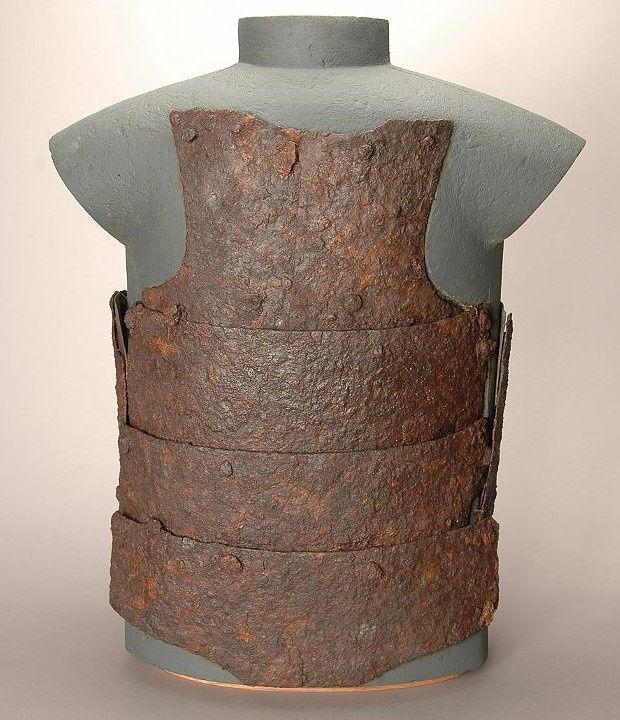
Brigandine from Visby
Design features of armour
Ideas of armour with plates under fabric was always clear enough. One shouldn’t be a genius to invent such armour. In fact, brigandine is a relative of all laminar, scale and lamellar types of body protectionthat were popular in Europe since Ancient Rome. Probably, it appeared in the end of the XIII century and was in use until the XVI century. But, brigandine did not come out of the blue.
Lorika sigmenta (segmentata) – armour that was made of metal straps, connected with leather belts. It has been already existed in the Ancient Rome.

Lorica segmentata Volume I & II Vol. I — A Handbook of Articulated Roman Plate Armour, Vol. II — A Catalogue of Finds. M.C. Bishop (vol. I) & M.D. Thomas (vol. II). 2002–2003.
Lamellar armour (made of plates, which were connected with leather strips or chainmail rings) were widespread in Europe and on the East.

From the book of Bengt Thordeman “Armour from the Battle of Wisby: 1361”
Precursor of brigandine – coat of plates (armour that consisted of plates, which were sewn over the fabric or leather base) was popular as well. So, there was only one step to rivet and hide these plates under the fabric and make an armour more ergonomical.
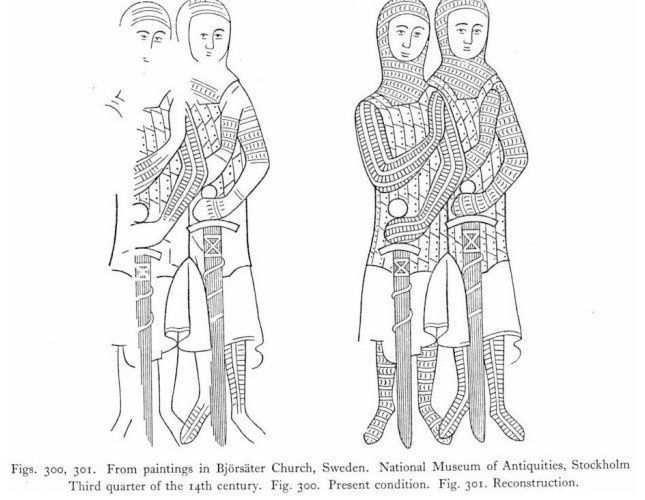
From the book of Bengt Thordeman “Armour from the Battle of Wisby: 1361”
To the XIII century, popular chain mail armour stopped to cater to the needs of warrior of this epoch. Weapon was developing, so soldiers required more reliable protection (and cheaper, ideally). Chain mail were reinforced with metal plates, plaiting had few layers, but it was not a comprehensive solution. Quantity of soldiers was growing, and everyone should be uniformed and equipped.
To make a chainmail, one should have good skills in blacksmithing and spend a lot of time and forces for braiding. However, mail did not take a blow at the high level, so people should invent more reliable and durable armour.
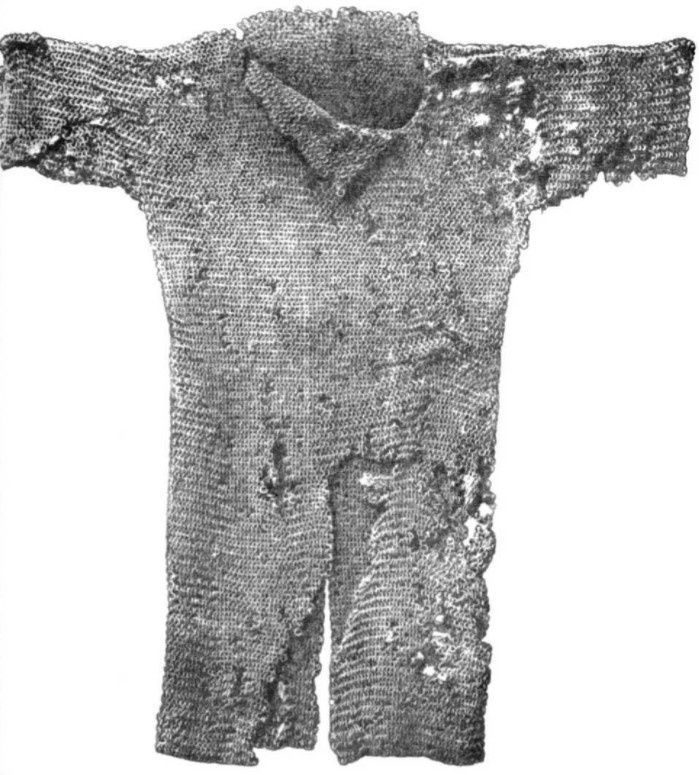
Chainmail from Volyn
Plate body protection was much more durable, than chain mail armour, but there were other problems. Full-plate armour should fit perfectly, so such type of protection was very expensive and made by individual order.

Brass memorial plaque of Ralf Newton, 1370 year, Essex (from Claude Blair “European armour”)
Besides, tempering, finishing, polishing and fitting of plate armour took additional time and finances. Just imagine how much a soldier did have to earn to buy top-quality armour. But, everybody wanted to have a good life, not only rich noblemen, but soldiers of fortune or common bodyguards as well.
It is a challenge to order plate armour for a troop of few thousand men. Firstly, it is very expensive, secondly – who would be able to make such order in short terms? Brigandine protection is a different story, as they are cheap enough and easy to manufacture. Remember, archaeologists found a burial place of 1186 people, most of which were equipped just in brigandines. That may mean that there were artisans in Europe of these times, who was making such armour.
Why a brigandine in particular?
For what reason? What caused popularity of this type of body protection? An answer is simple: advantages of brigandine are unquestionable. Let’s go into the question at large.
Brigandine takes a blow much better than a chainmail or padded armour and is not far below early plate armour. Almost every blacksmith is able to manufacture it. It is not necessary to polish brigandine and bring it to perfection, as metal plates are hidden under fabric and prices is not high.
Steel Mastery reconstruction of medieval brigandine
Armour was being worn over the padded gambeson, so it provided with perfect protection with minimum expenses. Other good combination for a battle was a brigandine worn over chainmail.
Even if an armour was damaged during the fight, brigandine could be reassembled, using other fabric base, so it became as good as new one. It is not difficult to repair a brigandine by yourself: take a hammer and planish bent plates, patch holes up and that’s it! Armour is ready for further use!
Brigandine armour for fans of the Middle Ages
We offer you to purchase a brigandine at our site. Such protection is perfect solution for reenactors and fans of historical fencing. This armour is light, comfortable and reliable, and it takes blows perfectly. Unlike the cuirasses and breastplates, brigandines are more movable. There are European and Asian models with fabric or leather base. You may choose any type of metal plates, colour and type of fabric. Armour has excellent look and fit, as it is being made according individual parameters of customer. You may adjust size and tightness with belts. We guarantee reliability of our products, as we use only high-quality materials for manufacturing.
It is very easy to order a brigandine. Choose a model, material, thickness of metal plates, accompanying elements and that’s it. We will do the rest and make your order on high quality level. So, you will get a product which you wish.
Besides body defense, pay your attention at brigandine protection for hands, arms and legs, and fittings as well – if you are fascinated by metal armour, it will come in handy. We will talk more on that in our next articles.



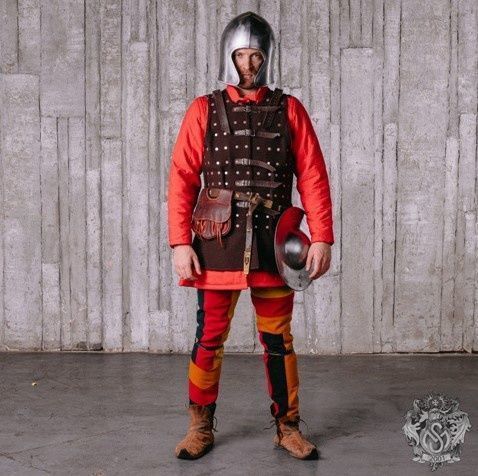

0 Kommentare
Steel-mastery.com